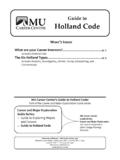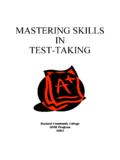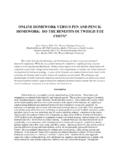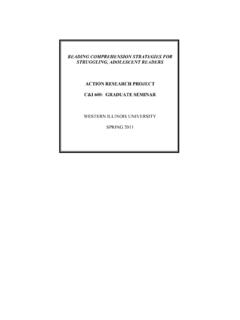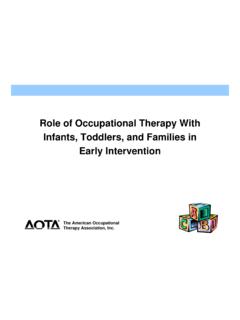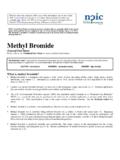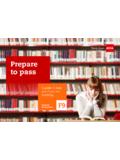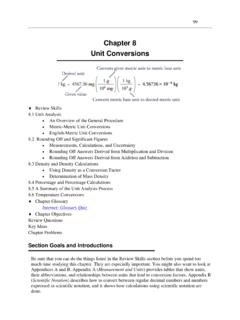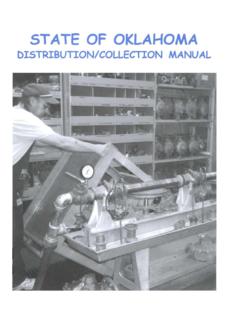Transcription of MULTIPLE CHOICE EXAMS - WIU
1 Learning Commons Fastfacts Series 2005for extensive information to help you with many aspects of MULTIPLE CHOICE , from study strategies through ways to untangle difficult I: Preparation StrategiesStay on Top of Your CoursesSince MULTIPLE CHOICE EXAMS are common in courses which cover a lot of factual information, the most important planning strategy is to stay on top of your coursework. If you keep up with readings and assignments, attend lectures and take thorough notes, and set aside time to integrate and summarize your text and lecture notes on a regular basis, you ll be well on your way to preparing effectively for MULTIPLE CHOICE EXAMS . Weekly review right from the beginning of the semester can drastically reduce the amount of time you ll need to spend relearning old material before the exam. We recommend that you begin each study session with a quick review of the material you ve studied previously, so the previous material stays fresh.
2 Attending Supported Learning Group sessions regularly is another good way to ensure you re processing and keeping up with course you make the time to review weekly, you ll avoid having to cram at the last minute. When you cram, the information you ve studied stays in your memory for a limited time. That means that you ll probably forget most or all of the information as soon as you ve finished the midterm or exam. While cramming might seem like a timesaver at first, it usually ends up costing you in later semesters, when you ll have to relearn information from previous courses. By incorporating regular review into your study schedule, you ll make a difference in your exam performance now and in the future. For ideas and suggestions about how to fit weekly review into your schedule, check out the Learning Commons time management CHOICE EXAMSM ultiple CHOICE : do you love it or hate it?
3 Few other exam formats provoke such passionate responses as MULTIPLE CHOICE , yet this format is common at the university level. If you prefer other types of exam formats to MULTIPLE CHOICE , understanding why you dislike MULTIPLE CHOICE may help you determine what steps to take to master this exam format. We ve encountered a few common reasons for some students difficulty with MULTIPLE CHOICE ; see if you can identify with any of these situations. For some students, MULTIPLE CHOICE is an unfamiliar format for EXAMS . If your high school emphasized homework completion, essays, or short answer EXAMS over MULTIPLE CHOICE , it may seem frustrating to be almost solely evaluated through a brand new format. You may have a steep learning curve at the beginning as you prepare for and write MULTIPLE CHOICE EXAMS , but many students find that they quickly adjust. Other students think MULTIPLE CHOICE is difficult because they don t expect the questions to have the layers of complexity found in university-level EXAMS .
4 They may study for MULTIPLE CHOICE by focusing only on the recognition of basic terminology rather than on a thorough understanding of course concepts. In this situation, modifying your exam preparation strategies can help you prepare for MULTIPLE CHOICE . Still other students dislike MULTIPLE CHOICE because they re convinced that MULTIPLE CHOICE questions are phrased to trick students deliberately into choosing an incorrect answer. It s true that some MULTIPLE CHOICE questions are worded awkwardly, and you ll have to put in additional effort to decode those questions. However, very few MULTIPLE CHOICE questions are deliberately tricky. Questions are designed to challenge you and encourage you to think, but not lead you to the wrong your feelings about MULTIPLE CHOICE , you ll encounter this format often at university, especially in first- and second-year courses.
5 Keep reading this Fastfacts Your Approach to Studying If you ask experienced, successful students for their advice on how to prepare for MULTIPLE CHOICE EXAMS (as we did in writing this Fastfacts), you would probably find that there are two different approaches. Some students advocate an emphasis on factual detail, terms, and definitions. They memorize as much material as possible and make note of small but interesting details. Other students concentrate on understanding the course ideas and concepts which knit the facts and details together. They emphasize the relationships, similarities, and differences between many MULTIPLE CHOICE EXAMS test for both the recall of facts and an understanding of concepts, the approach you take to studying for MULTIPLE CHOICE tests must be based on a thoughtful analysis of your course and your instructor s approach to the material.
6 You ll be better prepared for major EXAMS if you look at each test during the semester as an indication of not only how much of the course material you know, but also what type of knowledge (factual details, conceptual understanding, or a combination) the instructor expects you to have. The safest approach to studying for MULTIPLE CHOICE EXAMS is to acquire a thorough knowledge of the facts, as well as an understanding of the concepts and ideas underlying Your study EffectivenessA common error students make when preparing for MULTIPLE CHOICE EXAMS is to study only to the point where they can recognize the correct answer ( after all, the right answer is on the page in front of you .. ). However, MULTIPLE CHOICE EXAMS test not only your ability to recognize information, but also your ability to apply facts and concepts in new contexts. To ensure that you can do more than just recognize the right answer, test yourself periodically as you re studying: Once you re done reviewing a section of your notes, put them away and try to summarize the information, on paper or orally.
7 Try explaining the concepts to friends and study partners. Draw a diagram to summarize the information, using boxes for main concepts and arrows to show how they re related. Our Fastfacts on Concept Mapping has detailed information about creating effective concept like these can be used to test your ability to recall the material and to re-organize and transform it into a new format. Since very few MULTIPLE CHOICE EXAMS repeat course information in the same way that it was covered in class, you ll need to prepare for EXAMS by studying the course material in a variety of ways. You ll become better prepared for exam questions which apply or present material in new ways that weren t discussed in class or in the text. Write Your Own MULTIPLE CHOICE QuestionsSince MULTIPLE CHOICE EXAMS demand that you deal with the course material in a specific format, your preparation should include practice in both writing and answering MULTIPLE CHOICE questions.
8 Writing MULTIPLE CHOICE questions enables you to see the information from your notes and text translated into the MULTIPLE CHOICE format before the exam itself. Try these ideas when creating questions: Turn the headings and subheadings in your textbook into questions. Turn key concepts from lecture notes into questions. Look at the first midterm, or other ones written by the same instructor, to get a sense of the style of the questions. Write practice questions with a study partner or group, with each of you preparing questions on a section of a chapter, then trading and answering each other s questions. Practise Answering Real QuestionsYou ll also need to practise answering real MULTIPLE CHOICE questions. There are a number of places where you might find practice questions: 3. Textbooks and lab manuals often have MULTIPLE CHOICE questions, though some students find that these are much easier than the ones on the exam.
9 Many textbooks have CDs or Websites; check these out for possible review questions. Look for old midterms and EXAMS ; Biology House maintains a library of midterms and EXAMS from many courses, and some instructors place old EXAMS on file in their department or on reserve in the Library. You can also ask your instructor or TA for an old exam if there aren t any on file. Many instructors post practice questions on the course WebCT site. Different textbooks on the same subject can also be good sources of practice questions. Wherever you get practice questions, it s important to limit the time you give yourself to write the practice exam (because you won t have endless amounts of time during the exam) and to correct your answers. If Your Exam is OnlineFind out as much as you can about the exam well in advance so you ll have time to prepare appropriately.
10 You should be able to answer these questions about your exam: Is the exam open book? Will I see one question at a time, or can I scroll through the entire exam? Will I have to answer each question before going on to the next? Can I go back to unanswered questions? Can I change an answer? Can I print out the exam, complete it on paper, and then type my answers into the computer? If your exam is open book, study and prepare for it in much the same way you would for a regular exam; don t assume that you ll have time to look up answers while you re writing the exam. However, it may be worthwhile to tab the important pages in your notes and text so you can reference them quickly. An alternative is to create your own crib sheet a one page sheet which contains all of the essential information about the course material. If your exam restricts you from changing your answers, skipping questions, or reading ahead, keep in mind that these restrictions may place additional stress on you.
